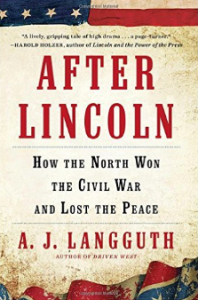Submitted by Peter Denison
 AFTER LINCOLN: How the North Won the Civil War and Lost the Peace, by A. J. Langguth
AFTER LINCOLN: How the North Won the Civil War and Lost the Peace, by A. J. Langguth
Langguth gives a lively account of the Reconstruction period, primarily 1865-1877. Most of the chapters are built around a primary character. Indeed he even includes a list of the primary characters. His list includes several Southerners such as General Lee and Jefferson Davis, and also some Southern Republicans who allied with the former slaves to seize control of most of the Southern states. Some of the Negroes proved to be quite capable both as political strategists and as administrators. Some were elected to Congress, but never in proportion to their numbers. Langguth clearly presents the opposition from White southerners and shows how they gradually destroyed the Reconstruction envisioned by President Lincoln. Why did the Southerners succeed?
Reconstruction was chaotic, at least in part because the North did not really know what it wanted. Southern Whites were firmly opposed to civil rights and equality for the African Americans to whom they continually referred using a vulgar racial epithet. They hated the Northerners who came down to handle the details of emancipation and see to it that African Americans were not oppressed. After the death of Lincoln, President Andrew Johnson showed little sympathy for Negroes and all too often sided with the White Southerners even when they used extreme violence against Negroes. He did betray Lincoln’s legacy and southern Negroes would have fared somewhat better if Johnson had not only been impeached but also removed from office. (Yes, I disagree with John F. Kennedy’s views in Profiles in Courage.)
Thousands of Negroes were killed as Federal troops often turned a blind eye. President Grant did try to enforce Negro rights, but troops on the ground did not always do his bidding. Once the Democrats gained a majority in Congress they were able to cut the appropriations for the armed forces, thus making enforcement even more difficult.
White southerners wanted to put the Negro in his place and bring back White supremacy. They called themselves “Redeemers” and used many tools of violence including the Ku Klux Klan. The Radical Republicans did push through the 13th, 14th, and 15th Amendments to the Constitution. Republican hatred of President Johnson probably helped to get wavering Republicans to support these measures. Even Northerners who had sympathized with the condition of Negro slaves began to lose interest. There was more political interest in opening up the western parts of our country. Railroads were built both in the west and in the former Confederate states. Southerners did want railroads and factories, but definitely not Negro equality.
But when Langguth speaks of the North losing the peace, is he really accurate? I would say no. In the pre-war period the abolitionists were generally a minority even in northern states. Even the abolitionists did not believe in racial equality. John Brown, who was hanged for leading a raid attempting to free slaves by force, did both believe in and practice equality. He and his whole family joined and participated in a Negro church. Most northerners were as racist as their southern brothers. Leaders like Lincoln were worried about what the Supreme Court would do. Chief Justice Taney in 1857 in the Dred Scott decision stated that a slave who had spent a long period in a free state was still a slave. Black men had “no rights that a white man must respect.” The logic of that decision could, as Lincoln feared, lead to another decision that a slave owner could bring his slaves to any free state and still keep them as slaves, essentially making slavery legal in all the states, north and south. Almost all Northerners were opposed to such an outcome. They did not want Negro slaves to compete with White men for jobs or for land in the western plains. Their anti-slavery convictions were never based on sympathy for Negroes.
Woodrow Wilson has long been regarded as one of our great presidents. The only criticism involved his handling of the failed League of Nations treaty. Only recently has he been perceived as a racist. And a racist he certainly was. When he became President, segregation in Washington had been ended; he reinstituted it. In 1915 the movie Birth of a Nation was regarded as a great movie. It represented the Negro as being completely incompetent and the KKK’s activities as being completely justified and necessary in order to save law and order in the South. Wilson liked the movie and so did most American people.
No, the American people got what they wanted. The abolitionists did not get all they wanted, but even most of them were not enthusiastic about racial equality. Only after World War II ended did Americans begin to think seriously of and desire real equality. Even now a large segment of Americans are either opposed to equality, or at least lacking much fervor for the subject.